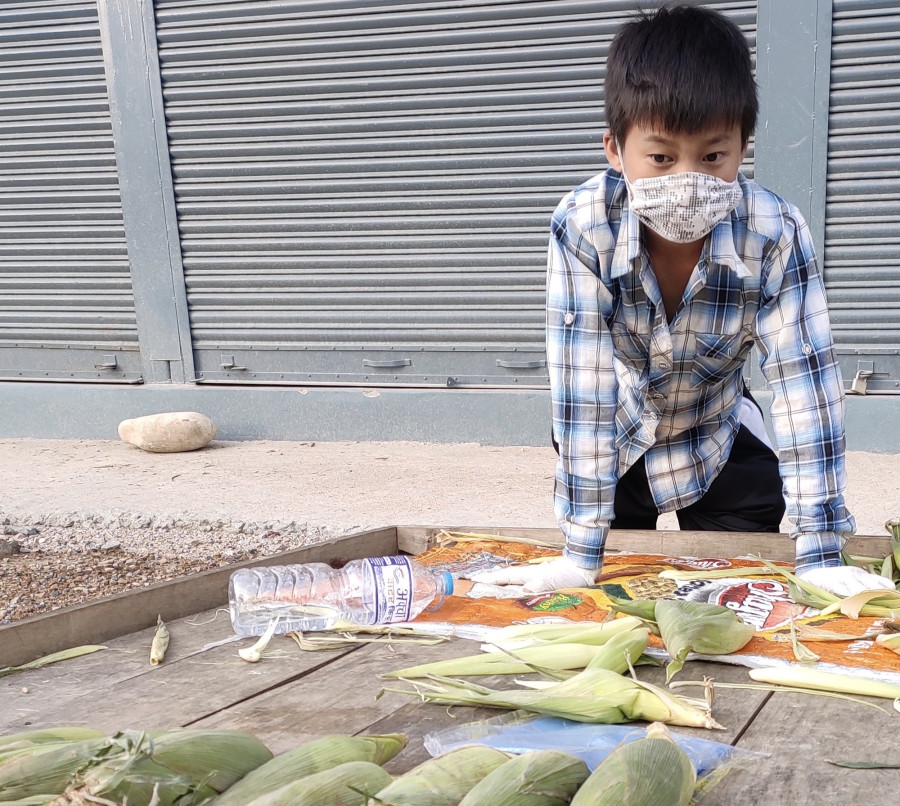National
Children from low-income working class families can't join online classes
Schools and colleges across the country are rolling out online classes, but those without the means to get a computer or an internet connection are being left out.
Anup Ojha
Fourteen-year-old Sunil Magar’s daily routine has changed for over a month now. Every day, after 3pm, this eighth grader who lives with his single mother, sells maize cobs at Satdobato, Lalitpur near his room.
Sunil goes to Bright Future School, Satdobato, but he hasn’t been doing well in his studies, as he has to help his mother Mankumari earn enough to sustain life in the city.
The prolonged lockdown has made things harder. “He can’t study at home, he needs to help me earn to pay our rent and his school fees,” said Mankumari Magar, 40.
When Sunil sells maize on the street from his cart, his school runs online classes, but he is not attending them, said Sunil, whose father tied the knot with another woman, and now lives separately.
Sunil neither has a laptop or an internet connection at home. “Sometimes, I attend online classes using mobile data, but it does not work properly,” said the teenager who wears a mask and a pair of gloves at work. “My mother gets these cobs in the morning. During the day I sell it here,” he said.
It’s not only Sunil, children from working class families across the country have been deprived of access to online learning although virtual classes have roped in children from middle and upper class families.
Schools and colleges across the country have started online classes as the Covid-19 lockdown goes on for over two-and-half months. But education experts say it’s a futile exercise as it does not serve the poor and the marginalised.
“In a country like ours, the virtual education system is not for commoners, the government has been promoting it just to appease private schools whose interest is in earning money,” said Binay Kusiyati, a professor at the Tribhuvan University. He said virtual education has created a disparity between the haves and have-nots in society.
In Kalimati, Balkhu, Tinkune, and Kalanki areas of Kathmandu many children of school going age help their parents sell vegetables. Most of them don’t know what virtual classes are.
“I only use Facebook and Tiktok on my phone, I don’t know about virtual class,” said Sumitra Tamang, 14, a seventh grader who goes to a government school in Kathmandu. Tamang helps her parents sell vegetables in Balkhu.
Ram Prasad Sedhai, 43, from Chhauni, father of Ritika Sedhai, 12, a student of Gyanodaya Secondary School, Kalanki, said he can’t afford his daughter’s online classes. Sedhai, who used to work as a priest with the Marwari community, has had no work for over two-and-half months.
“Many people in my neighbourhood talk of online classes. We don’t even have the money to pay our rent, how can I get an internet connection and a computer for her?” asks Sedhai who has not been able to pay his rent for three months.
He does not believe that schools can teach students online. “They don’t even study in class in the presence of teachers with sticks on their hand. How can you expect them to study on a computer?” said Sedhai.
Gyanodaya, one of the well-known community schools in the Valley, has been conducting online classes for its grade 10 students, said Sita Devi Bhusal, who teaches at the school. “But, many students do not have access to the internet.”
“On Friday only I called 33 students, only 17 picked up the phone. Only four had access to the internet,”said Bhusal.
Schools and colleges across the country have been closed since March 18, and there are no signs that they will reopen anytime soon as the number of coronavirus infections and deaths related to the ailment have been rising steadily.
Last week the government extended the nationwide lockdown for two more weeks, as the cases of coronavirus infections rise.
Kusiyati appeals to the government to roll out online education only after working on improving access to computers and the internet for working class people. “Otherwise, can a woman who sells maize cobs on the roadside or a porter provide for their children’s virtual education?”




 9.6°C Kathmandu
9.6°C Kathmandu.jpg)














